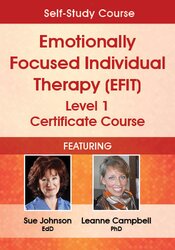What is Emotionally Focused Individual Therapy (EFIT)?
Provide a safe and supportive environment for your clients with this modality

The problems your clients have with emotion regulation... with decision-making... with self-esteem... with relationships – when you tie them back to core attachment injuries, they tell the full picture of a child whose needs for connection were never met.
What if there was a way to quickly get to the heart of the matter and heal those early traumas? To give your clients not just the relief of symptom reduction, but also the lasting stability and resilience of repaired, secure attachment?
Emotionally Focused Individual Therapy (EFIT), developed by Dr. Sue Johnson, is a therapeutic approach that primarily focuses on addressing an individual's emotional well-being and psychological issues. It is an adaptation of Emotionally Focused Therapy (EFT), which was originally developed for couples and families.
In EFIT, the therapist works with the individual to explore and understand their emotional experiences, often rooted in past relationships, attachment patterns, and life events. The primary goal of EFIT is to help clients gain insight into their emotions, develop a more secure and healthy sense of self, and learn to regulate and express their feelings in a constructive manner.
The therapy process in EFIT typically involves:
And if you're ready to learn more, EFIT and EFIT developer Dr. Sue Johnson shares the 10 core tenants of attachment theory and explains how crucial they are to understanding Emotionally Focused Individual Therapy (EFIT). READ MORE >
What if there was a way to quickly get to the heart of the matter and heal those early traumas? To give your clients not just the relief of symptom reduction, but also the lasting stability and resilience of repaired, secure attachment?
Emotionally Focused Individual Therapy (EFIT), developed by Dr. Sue Johnson, is a therapeutic approach that primarily focuses on addressing an individual's emotional well-being and psychological issues. It is an adaptation of Emotionally Focused Therapy (EFT), which was originally developed for couples and families.
In EFIT, the therapist works with the individual to explore and understand their emotional experiences, often rooted in past relationships, attachment patterns, and life events. The primary goal of EFIT is to help clients gain insight into their emotions, develop a more secure and healthy sense of self, and learn to regulate and express their feelings in a constructive manner.
The therapy process in EFIT typically involves:
- Emotion exploration: Clients are encouraged to identify and delve into their emotions, recognizing how they affect their thoughts, behaviors, and relationships.
- Attachment-focused work: Therapists help clients understand how their past attachment experiences and relationships may influence their current emotional struggles and patterns.
- Emotional regulation: Clients learn to manage and express their emotions in a healthy and adaptive way, which can lead to improved mental well-being and interpersonal relationships.
- Personal growth: The therapy aims to facilitate personal growth and self-awareness, empowering individuals to make positive changes in their lives.
And if you're ready to learn more, EFIT and EFIT developer Dr. Sue Johnson shares the 10 core tenants of attachment theory and explains how crucial they are to understanding Emotionally Focused Individual Therapy (EFIT). READ MORE >
Get to the heart of the matter with attachment-based assessment

In this intensive certificate training program, you'll learn exactly how to help clients process their strong emotions as you train directly with Dr. Sue Johnson, the developer of Emotionally Focused Individual Therapy (EFIT), along with senior trainer Dr. Leanne Campbell.
PLUS, once you complete this training, you'll receive your Level 1 Certificate in EFIT from the prestigious International Centre for Excellence in Emotionally Focused Therapy (ICEEFT) — demonstrating your commitment to helping clients gain life-changing access to skills for transforming painful emotions on their journey toward wholeness.
PLUS, once you complete this training, you'll receive your Level 1 Certificate in EFIT from the prestigious International Centre for Excellence in Emotionally Focused Therapy (ICEEFT) — demonstrating your commitment to helping clients gain life-changing access to skills for transforming painful emotions on their journey toward wholeness.





